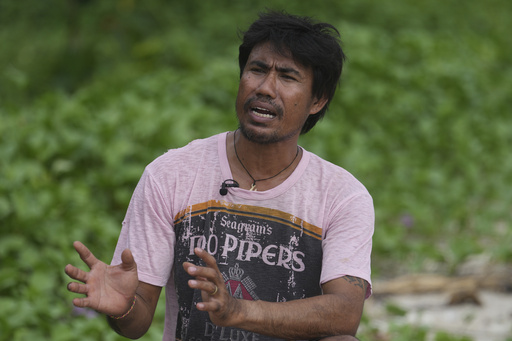
In the Surin Islands of Thailand, a poignant shift is occurring among the Moken community, an indigenous group with a rich heritage tied to the sea. Suriyan Klathale, affectionately known as Hook, recalls a childhood spent diving into the ocean from the family boat, or kabang, which served as both their home and a means of livelihood. This vessel was fundamental to the Moken way of life, providing a connection to the ocean that defined their existence. Yet now, many members of the community, including Hook, have made the transition to living on land, leaving behind memories of a time when the sea was their daily environment.
The Moken gained international attention following the devastating Indian Ocean Tsunami in December 2004, which claimed over 200,000 lives. Their unique ability to read the ocean allowed some tourists in the area to survive, as Moken locals knew to seek higher ground when they observed the water receding. However, the traditional lifestyle of these sea nomads is rapidly diminishing under social and political pressures.
As one of the many tribal groups in Thailand without formal recognition, the Moken have long fought for a law that would enshrine their rights and support the continuation of their cultural practices. The latest iteration of such legislation, aimed at protecting the way of life for ethnic groups, was tabled in Parliament just last month. This proposed bill seeks to provide fundamental rights—such as access to healthcare, education, and land—to help safeguard the distinct identities of communities like the Moken.
For the Moken, maintaining the kabang and their maritime traditions is essential. The wooden boats, characterized by their unique design, are a symbol of their identity. According to Hook, “It’s like a lifetime of a person, of a family.” Historically, these vessels accommodated multiple generations, allowing families to live together at sea. An elder, known as Tat, shared that a rite of passage in Moken culture involved learning to build a kabang, signifying readiness to start a family.
Despite their significance, very few community members now inhabit boats. Academics like Narumon Arunotai from Chulalongkorn University attribute this transformation to multiple factors, including stringent border policies, difficulty sourcing suitable wood, and the tsunami’s destruction of traditional vessels. Other groups of sea nomads in Thailand face similar challenges as they abandon their historical seafaring lifestyle.
The Moken are spread across around 800 islands along the Myanmar-Thailand coastline. Historically, they only turned to land during the monsoon season, venturing ashore until favorable sailing conditions returned. Fishing and foraging were core to their sustenance. In the past, many elders recall being born and raised aboard boats, roaming freely across the waters—a contrast to the restrictive realities faced by younger Moken today.
As time passed, the Moken’s ability to traverse the waters became increasingly constrained. Many chose to settle permanently in the Surin Islands, driven by the search for stability and safety from piracy. In 1981, the lands they frequented became protected areas, further complicating their reliance on traditional livelihoods since they could no longer harvest the materials needed to construct kabangs.
Building a kabang requires specific tree species that are increasingly hard to access due to conservation laws. Creating a single vessel involves a communal process of gathering and shaping wood, which is now rarely undertaken due to the constraints of modern life. Ngui, Hook’s brother, along with other community members, once sought permission to chop down suitable trees for boat-making, but were met with refusals. Presently, the only kabang in Surin is primarily used for tourism, while Hook owns a modern rendition built using planks, funded by a donor following a documentary on his efforts.
As traditional skills fade, the urgency to pass down knowledge becomes critical. Tat has made it his mission to teach the younger generation about boat construction and cultural practices, fearing that without such knowledge, their heritage may vanish entirely. Along with Wilasinee Klathale, a local teacher, he strives to teach village children about the ocean’s importance and traditional Moken music and dance—subjects not covered in their school curriculum.
Today’s youth express greater concern for job prospects than for learning ancestral skills. Employment opportunities for the Moken largely hinge on the tourist season, which runs from November to April, creating financial uncertainty for the rest of the year. Boyen Klathale, a young Moken man, articulated the struggle to secure work that fits within the community while also providing for the family. Previous efforts to secure additional fishing rights have often been turned down, leaving hopes for sustainable self-employment through local crafts and tourism support.
Despite challenges, a glimmer of hope emerged with the appointment of a new park chief in 2024. Kriengkrai Pohcharoen expressed a willingness to collaborate with the Moken on boat-building initiatives, albeit under certain conditions. He emphasized a desire to enhance their living standards while promoting sustainable practices.
The Moken remain pragmatic about their transition to land-based living, with many acknowledging its benefits while cherishing the memories of their traditional maritime life. “The world is changing and that’s the way it is,” reflected Ngui. “I just want it to stay as long as possible.” As these indigenous people navigate the complexities of modern life, the preservation of their culture and identity remains a pivotal journey.
